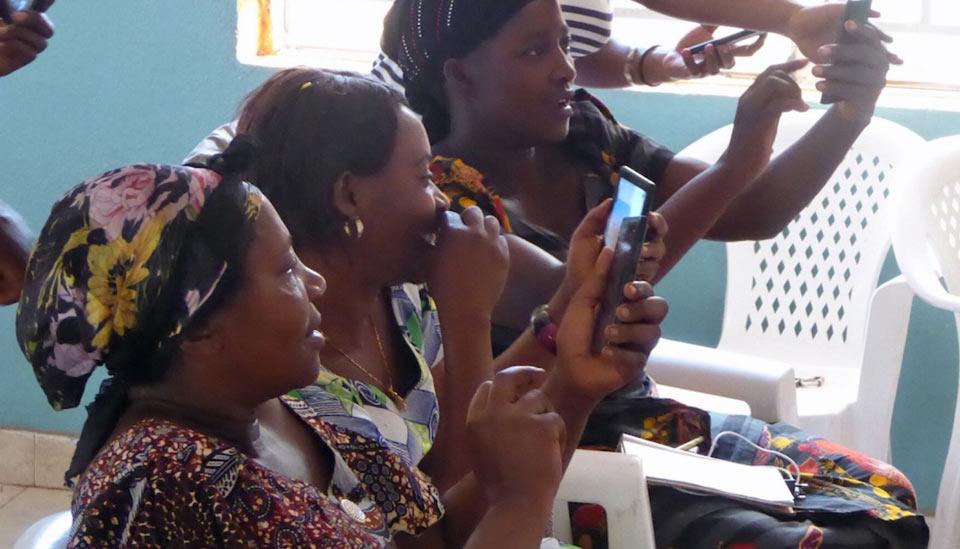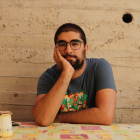
Image description: Three women laughing and looking at mobile phone to take selfie. Image source: Ensemble Pour La Différence
In the Eastern Democratic Republic of Congo (DRC), and specifically on the island of Idjwi in Lake Kivu, one group has been working to empower people who are often ignored by the international community. "Ensemble Pour La Différence" (Ensemble for short) describes itself as a "social business incubator that empowers entrepreneurs to help improve livelihoods and wellbeing across Eastern Congo". What this means in practice is that Ensemble, using various means such as business and financial support and design and technology, helps local actors in Idjwi (and beyond) with what they need to become independent and benefit their community.
Ensemble is also responsible for PamojaNet (Pamoja means 'together' in Swahili), a community-owned network for people living in Idjwi.
Since 2014, 24 businesses in the Eastern DRC have benefited from Ensemble's work. This includes the employment of 3,900 people and the distribution of 500,000 products and services. The businesses supported by Ensemble also generate USD 4 million in annual revenue.
The DRC has its fair share of problems, so much so that it has become associated outside of the country with chaos and violence. Lying just beneath the surface however, and often outside of the international spotlight, are groups of people creating genuine change.
In an interview with GenderIT, Chako Armant, a lead researcher at Ensemble, spoke about her work and the ongoing challenges faced by women in Idjwi in the struggle to expand community-based connectivity initiatives through PamojaNet.
Joey Ayoub (JA): Can you start by introducing yourself and Ensemble Pour La Difference?
Chako Amant (CA): My work consists of researching and implementing our projects in order to understand what our local partners need to go forward. As for PamojaNet specifically, Ensemble has installed this mesh of Wi-Fi networks on the island of Idjwi four years ago.
In addition to being a researcher, I'm also a journalist. As they say, "once a journalist, always a journalist". I am a member of the Association des Femmes des Médias, AFEM ("Union of Women in Media" in French) which defends the rights of women in media in every respect. So I have spent a lot of time with programs designed to raise awareness regarding the role of women in society. In addition to all of that, I am an economist, a mother of one and under 30.
JA: What do you hope to get out of these initiatives?
CA: My ambition is to see positive masculinity replace the current paradigm in all walks of life, whether within PamojaNet or in an office or a market or a village. Positive masculinity is accepting to see doors open for women for the benefit of all, instead of the backward thinking still dominating today's world. That being said, my immediate goal with PamojaNet is to show people what the internet's potential really is. I want to show people that through the internet they can get access to skills and even sell their products, that they can advertise themselves and make themselves more known. It's true that this takes time, but just letting people know is already a step in the right direction. I hope that through my work more women feel empowered to become more independent. That's what I hope will happen.
I want to show people that through the internet they can get access to skills and even sell their products, that they can advertise themselves and make themselves more known.
JA: Regarding PamojaNet, what was its purpose?
CA: Our goal was to open up the island as our research showed that its internet connectivity was very poor, including in schools and universities. Since then, many things have been done in Idjwi such as setting up a team-based there and installing antennas to expand internet coverage and allow us to work with local clients. These can include hotels or even just individuals who need their offices to be connected. We also created a cheap system for students and others who can't afford an internet connection. By this, I mean that we created a public office with local and international news displayed on a large screen, allowing residents to know what's happening in the DRC and around the world. Students can also know about their courses, exam results, and so on. It's with this in mind that Ensemble, both RDC and UK divisions, decided to join APC to have access to grants that allow us to do our work.
Expanding PamojaNet, as we told other groups in Kenya, is crucial because many people live far from the office and can't benefit from it. We've also been focusing on empowering women as that's still a real challenge. So for example I've been working with our local technician and, if all goes well, we will have a team of two women and two men in Idjwi soon to help people familiarize themselves with the internet. I'm also researching ways to improve our work more broadly and I'm planning on going to Idjwi to work with our new team to see what they need to improve their work. Furthermore, I'm planning on having a survey of the local population to see if they're happy with our work and if not to know how to improve it.
JA: Have there been any gender-related challenges so far?
CA: This was definitely a challenge when we started. Unfortunately there is still a strong gender gap in our country. And Idjwi in particular is a village where men are expected to be a priority while women are associated with childbearing and the household. Women usually don't have time to connect to the internet, so we did a radio show to raise awareness and show all the advantages that a community can get when women are empowered. We even distributed smartphones, mostly to women, which caused some tensions as we also had to talk to the men.
Women usually don't have time to connect to the internet, so we did a radio show to raise awareness and show all the advantages that a community can get when women are empowered.
JA: What's your preferred medium?
CA: We usually mostly use radio because that's the medium that's most used by the population, but these days that office in Idjwi is getting a lot of attention as well since we put up the large screen.
JA: And what language? The DRC is known for its multiple languages. How do you deal with that?
CA: It's a challenge. The dominant languages used on the internet are English and French but aren't really spoken in Idjwi as Kihavu is the main language. But Swahili is understood, which facilitates things as Google Translate has a Swahili option. As many women are illiterate however, we try to find ways around it. For example, they may use the audio version on Google Translate and find what they need in Swahili.
Swahili is understood, which facilitates things as Google Translate has a Swahili option.
So there are all these obstacles preventing women from empowering themselves, which is why we believe that greater access to the internet and an improvement in the infrastructure can greatly benefit them. This may take some time to get a large percentage of women to become independent, but our project so far has been promising. We shouldn't abandon, but instead continue to progress.
JA: But what about the ongoing conflict? Has that harmed your work?
CA: There's a security situation throughout the RDC, although it's true that the east, in particular, is badly hit. It can be dangerous to walk alone at night in Idjwi which definitely disturbs our work. That being said, these are sacrifices we know we have to make. So we do things like working from home or getting to our residence before it gets dark, so on. So yes, it can be complicated but we make the effort and try our best to adapt to the situation.
JA: What role can access to technology, and especially to the internet, play in empowering women?
CA: A very big role. Access to the internet provides a certain discovery of the world and with it a knowledge of international human rights, and of women's rights particularly. Women here don't necessarily know their rights. They're not used to their lives being framed in this way. With the internet they can go online and see what other women are saying. So through PamojaNet, we are able to raise awareness about women's rights, to both women and men, and give women the tools to empower themselves. When we do our workshops we don't only speak of websites like Whatsapp or Facebook, but we also focus on teaching the students how to do research. This allows them to find answers to questions related to their health, for example.
When we do our workshops we don't only speak of websites like Whatsapp or Facebook, but we also focus on teaching the students how to do research.
JA: In some ways, greater access to the internet removes the middleman, which traditionally has been men.
CA: Yes, exactly.
JA: You mentioned being a mother of one. Do you see your work as opening up the way for your daughter?
CA: Yes! She's my first student. When she will be old enough I will definitely teach her how to be independent.Here in Africa it's just a reality that gender norms are rather rigid. There are things that men shouldn't do within the household for example because it's what women should do. Girls have to be closer to their mother in the kitchen and boys closer to their father in the living room. In this context, internet for girls is seen as something they can explore make-up tips whereas for boys it's about finding jobs and understanding world politics. I hope that this changes in the near future. It's not easy.
Internet for girls is seen as something they can explore make-up tips whereas for boys it's about finding jobs and understanding world politics. I hope that this changes in the near future.
- 4691 views






Add new comment